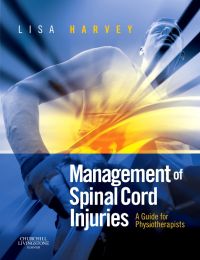Management of Spinal Cord Injuries, 1st Edition
Combining 25 years of clinical, research and teaching experience, Dr Lisa Harvey provides an innovative 5-step approach to the physiotherapy management of people with spinal cord injury. Based on the International Classification of Functioning, this approach emphasises the importance of setting goals which are purposeful and meaningful to the patient. These goals are related to performance of motor tasks analysed in terms of 6 key impairments. The assessment and treatment performance of each of these impairments for people with spinal cord injury is described in the following chapters:
- training motor tasks
- strength training
- contracture management
- pain management
- respiratory management
- cardiovascular fitness training
Dr Harvey develops readers' problem-solving skills equipping them to manage all types of spinal cord injuries. Central to these skills is an understanding of how people with different patterns of paralysis perform motor tasks and the importance of differentmuscles for motor tasks such as:
- transfers and bed mobility of people
- wheelchair mobility
- hand function for people with tetraplegia
- standing and walking with lower limb paralysis
This book is for students and junior physiotherapists with little or no experience in the area of spinal cord injury but with a general understanding of the principles of physiotherapy. It is also a useful tool for experienced clinicians, including those keen to explore the evidence base that supports different physiotherapy interventions.
Combining 25 years of clinical, research and teaching experience, Dr Lisa Harvey provides an innovative 5-step approach to the physiotherapy management of people with spinal cord injury. Based on the International Classification of Functioning, this approach emphasises the importance of setting goals which are purposeful and meaningful to the patient. These goals are related to performance of motor tasks analysed in terms of 6 key impairments. The assessment and treatment performance of each of these impairments for people with spinal cord injury is described in the following chapters:
- training motor tasks
- strength training
- contracture management
- pain management
- respiratory management
- cardiovascular fitness training
Dr Harvey develops readers' problem-solving skills equipping them to manage all types of spinal cord injuries. Central to these skills is an understanding of how people with different patterns of paralysis perform motor tasks and the importance of differentmuscles for motor tasks such as:
- transfers and bed mobility of people
- wheelchair mobility
- hand function for people with tetraplegia
- standing and walking with lower limb paralysis
This book is for students and junior physiotherapists with little or no experience in the area of spinal cord injury but with a general understanding of the principles of physiotherapy. It is also a useful tool for experienced clinicians, including those keen to explore the evidence base that supports different physiotherapy interventions.
Author Information


